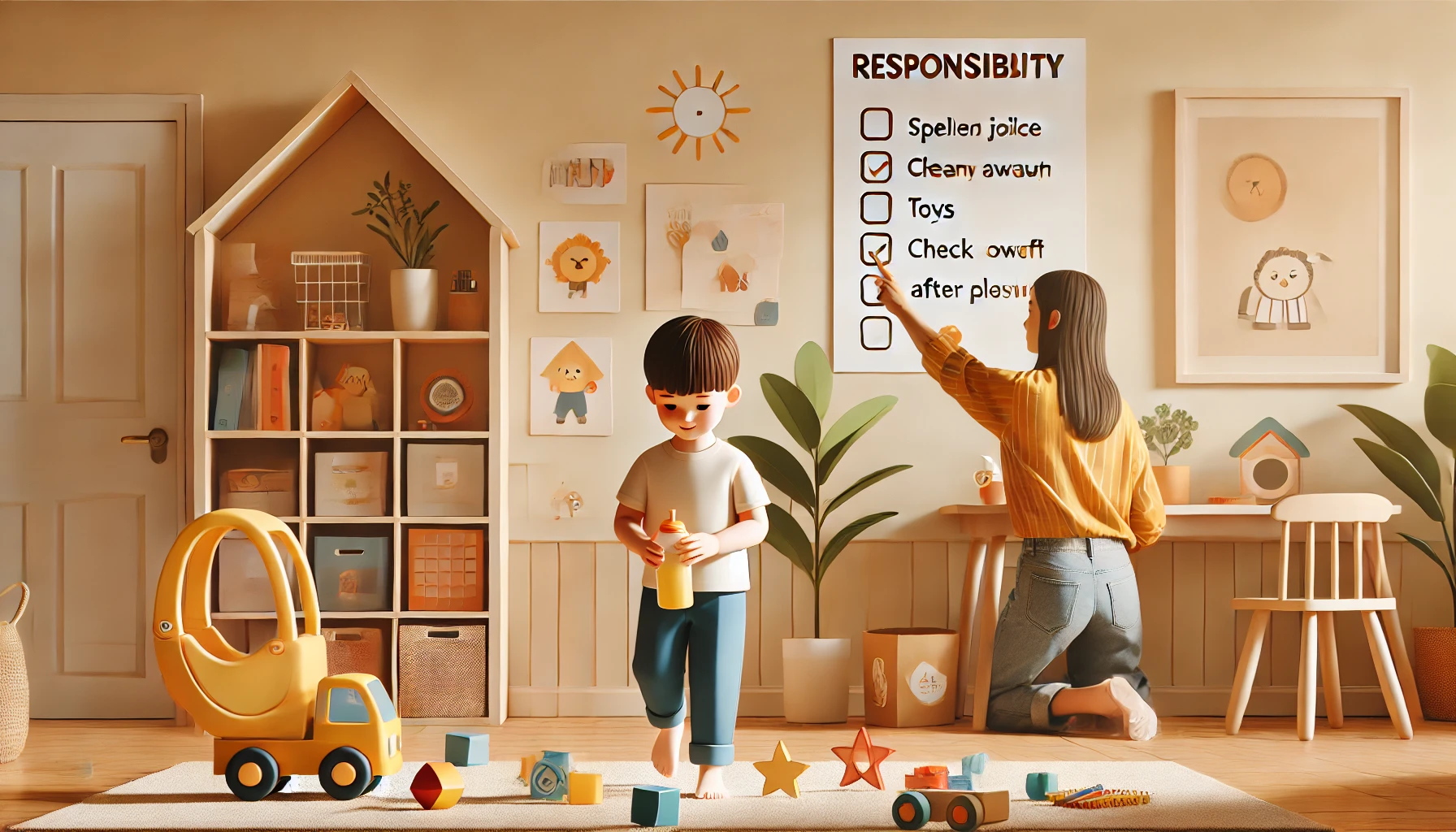How to Teach Young Children About Taking Responsibility for Their Actions
Teaching children to take responsibility for their actions helps them develop honesty, accountability, and problem-solving skills. When kids learn to acknowledge their mistakes, fix problems, and make better choices, they grow into more independent and trustworthy individuals. Parents can encourage responsibility through role-modeling, guided discussions, and real-life experiences. In this article, we’ll explore practical ways to help children take ownership of their actions.
Why Teaching Responsibility is Important
- Builds character and integrity – Encourages honesty and accountability.
- Develops problem-solving skills – Helps children find solutions to mistakes.
- Improves self-discipline – Encourages children to follow rules and meet expectations.
- Strengthens trust and relationships – Shows that taking responsibility builds respect.
- Prepares for future independence – Teaches kids to manage their own decisions and consequences.
1. Model Responsible Behavior
Children learn by observing how adults take responsibility for their own actions.
Activity Idea:
- If you make a mistake, say, “I forgot to do that! Next time, I’ll set a reminder.”
- Show responsibility by keeping promises and admitting errors: “I spilled the water, so I’ll clean it up.”
- Praise yourself out loud when you do something responsible: “I finished my work on time because I planned ahead.”
What Kids Learn:
- That everyone makes mistakes, even adults
- How to take responsibility without fear
- The importance of fixing mistakes rather than ignoring them
2. Encourage Children to Own Their Mistakes
Helping children acknowledge mistakes in a safe environment builds confidence and honesty.
Activity Idea:
- When a child makes a mistake, ask, “What happened? What can we do to fix it?”
- Avoid punishment for honest mistakes; instead, guide them toward a solution.
- Use positive reinforcement: “I love that you admitted your mistake. That’s very responsible!”
What Kids Learn:
- That mistakes are opportunities for learning
- The importance of honesty and accountability
- How to find solutions instead of blaming others
3. Give Children Age-Appropriate Responsibilities
Assigning tasks helps children develop a sense of responsibility in daily life.
Activity Idea:
- Give small chores like putting away toys, feeding a pet, or setting the table.
- Let children help with decisions, such as choosing their clothes or organizing their school bag.
- Use a responsibility chart where kids track completed tasks with stickers.
What Kids Learn:
- That responsibility means taking care of their own tasks
- How to feel proud of their contributions
- The connection between responsibility and independence
4. Teach the Connection Between Actions and Consequences
Understanding that actions have consequences helps children make better choices.
Activity Idea:
- If a child forgets to bring a toy inside, let them experience the consequence (e.g., it gets rained on).
- Discuss how small choices lead to big outcomes: “If we don’t clean up, our room will be messy and hard to find things in.”
- Encourage natural consequences instead of punishments, like cleaning up a spilled drink themselves.
What Kids Learn:
- That actions have real effects
- How to think ahead before making decisions
- The value of learning from mistakes
5. Encourage Problem-Solving Instead of Excuses
Teaching children to fix mistakes instead of making excuses builds problem-solving skills.
Activity Idea:
- If they break something, ask, “How can we fix this together?”
- When they forget to do a task, say, “What can we do to remember next time?”
- If they blame someone else, gently redirect: “Let’s focus on what you can do differently next time.”
What Kids Learn:
- That excuses don’t solve problems
- How to take action instead of shifting blame
- The importance of responsibility in fixing mistakes
6. Use Stories and Role-Playing to Teach Responsibility
Books and pretend play help children understand responsibility in a relatable way.
Activity Idea:
- Read books like I Just Forgot by Mercer Mayer or What If Everybody Did That? by Ellen Javernick.
- Role-play situations like spilling juice, forgetting homework, or losing a toy and discuss responsible actions.
- Ask, “What would a responsible person do in this situation?”
What Kids Learn:
- How responsibility applies to everyday life
- The importance of thinking before acting
- How responsible behavior benefits everyone
7. Praise and Reinforce Responsible Actions
Recognizing responsible behavior encourages children to continue practicing it.
Activity Idea:
- Say, “I love how you cleaned up without being asked—that was very responsible!”
- Use a “Responsibility Jar” where kids earn a small reward for completing tasks independently.
- Ask, “How did it feel to be responsible today?” to reinforce self-pride.
What Kids Learn:
- That responsibility is valued and appreciated
- How good it feels to take ownership of their actions
- The motivation to keep practicing responsible habits
8. Be Patient and Allow Children to Learn from Experience
Learning responsibility takes time, and mistakes are part of the process.
Activity Idea:
- If a child struggles to admit a mistake, say, “That’s okay. We’ll try again next time.”
- Encourage a growth mindset: “Mistakes help us learn, and taking responsibility makes us stronger.”
- Avoid rescuing them from small mistakes—let them learn from their experiences.
What Kids Learn:
- That responsibility is a skill they can improve
- How to learn from challenges instead of fearing them
- The importance of resilience and accountability
Final Thoughts
Teaching young children about taking responsibility for their actions helps them develop honesty, accountability, and problem-solving skills. By modeling responsible behavior, encouraging problem-solving, and reinforcing positive habits, parents can help children build a strong foundation for becoming responsible and independent individuals.
